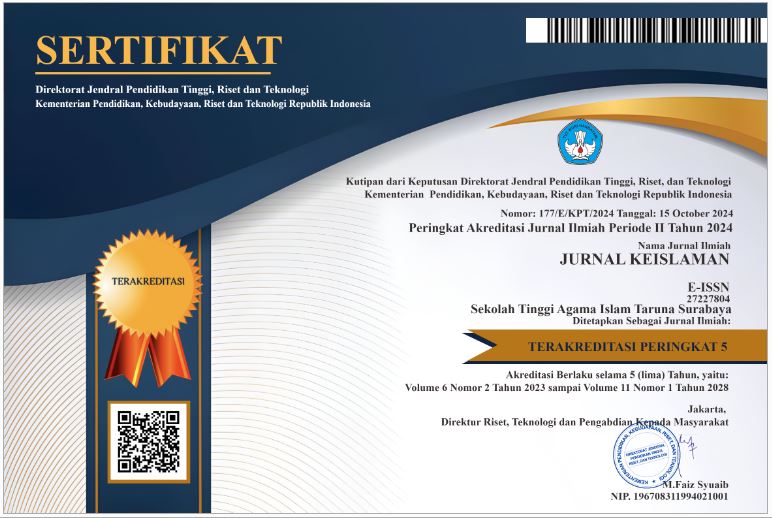Harmoni Sosial dalam Perspektif Islam: Tinjauan Terhadap Masyarakat Kontemporer
DOI:
https://doi.org/10.54298/jk.v7i1.252Keywords:
Dynamics of Social Harmony, Contemporary Islamic Perspective, Influence of Global Context, Inclusive Religious Education, Adaptation of Technology in Religious LifeAbstract
This study aims to explore the dynamics of social harmony in the perspective of Islam in contemporary society, considering the influence of global contexts and technological developments. A deep understanding of the religious values of Islam, active involvement in religious activities, and contributions to social activities are the focus of the study. The research method uses a qualitative approach by collecting data through religious literature studies, analyzing government regulations related to social harmony, and direct observation of the social dynamics of contemporary society. The data is then analyzed qualitatively to identify patterns in maintaining social harmony. The results show that understanding religious teachings is the main foundation for maintaining harmony, while active involvement in religious activities and contributions to social activities play a crucial role in forming harmonious social relationships. Challenges related to differences in religious understanding and the impact of global contexts and technological developments highlight the complexity of maintaining social harmony. As a recommendation, this study emphasizes the need for inclusive religious education, promotion of active involvement in religious activities, and strengthening social activities as key steps. Strategies to adapt to global and technological changes are also identified as important steps to overcome these challenges. The conclusion of this study is expected to provide guidance for stakeholders in dealing with the complex dynamics of maintaining social harmony in the perspective of Islam in contemporary society that is constantly changing.
Downloads
References
Abror, Mhd. “Moderasi Beragama dalam Bingkai Toleransi.” RUSYDIAH: Jurnal Pemikiran Islam 1, no. 2 (18 Desember 2020): 137–48. https://doi.org/10.35961/rsd.v1i2.174.
Ahmad Siddiq, Akhmad Munir Mufi, Aminullah Elhady, UIN Kiai Haji Ahmad Siddiq, Jember, Mursalim Mursalim, dan UIN Kiai Haji Ahmad Siddiq, Jember. “Section Articles Internalization of Religious Moderation Values: Active Tolerance and Social Harmony in Education in Indonesia.” el-Tarbawi 16, no. 1 (20 Juni 2023): 1–32. https://doi.org/10.20885/tarbawi.vol16.iss1.art1.
Azharghany, Rojabi. “Jejak Dakwah Kiai Sebagai Creator Dalam Dinamika Perubahan Sosial.” Dakwatuna: Jurnal Dakwah dan Komunikasi Islam 9, no. 2 (15 Juli 2023): 127–42. https://doi.org/10.54471/dakwatuna.v9i2.2349.
Chadidjah, Sitti, Agus Kusnayat, Uus Ruswandi, dan Bambang Syamsul Arifin. “Implementasi Nilai-Nilai Moderasi Beragama dalam Pembelajaran PAI: Tinjauan Analisis pada Pendidikan Dasar Menengah dan Tinggi.” Al-Hasanah : Islamic Religious Education Journal 6, no. 1 (26 Juni 2021): 114–24. https://doi.org/10.51729/6120.
Halimah, Lusi Nur, dan Warsiyah Warsiyah. “Implementasi Sikap Toleransi sebagai Nilai Pendidikan Islam dalam Kehidupan Sosial Keagamaan Masyarakat Plural.” Al-Fikri: Jurnal Studi dan Penelitian Pendidikan Islam 5, no. 2 (23 Desember 2022): 131. https://doi.org/10.30659/jspi.5.2.131-141.
Kaharuddin, Kaharuddin. “Kualitatif: Ciri dan Karakter Sebagai Metodologi.” Equilibrium: Jurnal Pendidikan 9, no. 1 (10 Desember 2020): 1–8. https://doi.org/10.26618/equilibrium.v9i1.4489.
Karunia H, Hans, Nauvaliana Ashri, dan Irwansyah Irwansyah. “Fenomena Penggunaan Media Sosial : Studi pada Teori Uses and Gratification.” Jurnal Teknologi Dan Sistem Informasi Bisnis 3, no. 1 (31 Januari 2021): 92–104. https://doi.org/10.47233/jteksis.v3i1.187.
Madekhan, Madekhan, dan Winarto Eka Wahyudi. “Efektifitas Partisipasi Finansial Masyarakat Dalam Lembaga Pendidikan Islam: Studi Kasus di Yayasan Guppi Lamongan.” Indonesian Journal of Islamic Education Studies (IJIES) 3, no. 2 (31 Desember 2020): 194–215. https://doi.org/10.33367/ijies.v3i2.1385.
Nata, Abuddin. “Peran dan Fungsi Masjid di Indonesia Dalam Perspektif Pendidikan Islam.” Ta’dibuna: Jurnal Pendidikan Islam 10, no. 3 (26 September 2021): 414. https://doi.org/10.32832/tadibuna.v10i3.5203.
Nugroho, Irzak Yuliardy. “Prinsip-Prinsip dan Karaktersitik Hukum Islam.” Ulumuna: Jurnal Studi Keislaman 7, no. 1 (15 Juni 2021): 126–41. https://doi.org/10.36420/ju.v7i1.4804.
Rafiud Ilmudinulloh. “Model Pembelajaran Berbasis Proyek untuk Mengembangkan Kemampuan Berpikir Kritis Mahasiswa.” Jurnal Riset Jurnalistik dan Media Digital, 21 Desember 2022, 121–28. https://doi.org/10.29313/jrjmd.v2i2.1366.
Ridwan, Irwan Muhammad. “Harmoni, Disharmoni, dan Integrasi Antara Sains dan Agama.” Jurnal Filsafat Indonesia 3, no. 1 (30 April 2020): 8–13. https://doi.org/10.23887/jfi.v3i1.22472.
Rustandi, Nanang. “Agama dan Perubahan Sosial Ekonomi.” Tsaqofah 18, no. 02 (28 Desember 2020): 185. https://doi.org/10.32678/tsaqofah.v18i02.3655.
Saleh, Aris Rahman. “Dimensi Keberagamaan Dalam Pendidikan.” Jurnal Jendela Pendidikan 2, no. 04 (20 November 2022): 580–90. https://doi.org/10.57008/jjp.v2i04.327.
Septian, Doni. “Pemahaman Nilai-Nilai Pancasila dalam Memperkuat Kerukunan Umat.” TANJAK: Journal of Education and Teaching 1, no. 2 (11 Agustus 2020): 155–68. https://doi.org/10.35961/tanjak.v1i2.147.
Sintasari, Beny. “Pemberdayaan Remaja Masjid dan Perannya dalam Pendidikan Islam.” Urwatul Wutsqo: Jurnal Studi Kependidikan dan Keislaman 10, no. 1 (18 April 2021): 100–114. https://doi.org/10.54437/urwatulwutsqo.v10i1.251.
Tresnadipangga, Bimo, Fokky Fuad, dan Suartini Suartini. “Harmonisasi Peraturan Perundang-Undangan dalam Pelaksanaan Bantuan Sosial di Republik Indonesia.” Binamulia Hukum 12, no. 1 (10 November 2023): 213–26. https://doi.org/10.37893/jbh.v12i1.438.
Yoan Colina. “Implementasi Kebijakan Pembangunan Bidang Agama dalam Mewujudkan Kesejahteraan Masyarakat.” Danum Pambelum: Jurnal Teologi Dan Musik Gereja 1, no. 2 (30 November 2021): 236–45. https://doi.org/10.54170/dp.v1i2.65.
Yusanto, Yoki. “Ragam Pendekatan Penelitian Kualitatif.” Journal of Scientific Communication (JSC) 1, no. 1 (2 April 2020). https://doi.org/10.31506/jsc.v1i1.7764.
Zuhriyandi. “Analisis Nilai-Nilai Kemanusiaan Atas Pemikiran Tafsir Buya Hamka.” At-Tahfidz: Jurnal Ilmu Al-Qur’an dan Tafsir 5, no. 1 (6 November 2023): 17–33. https://doi.org/10.53649/at-tahfidz.v5i1.354.
Downloads
Published
How to Cite
Issue
Section
License
Copyright (c) 2024 Ahmad Nilnal Munachifdlil Ula, Hanik Hidayati

This work is licensed under a Creative Commons Attribution-ShareAlike 4.0 International License.
Authors who publish with this journal agree to the following terms:
- Authors retain copyright and grant the journal right of first publication with the work simultaneously licensed under a Creative Commons Attribution-ShareAlike 4.0 that allows others to share the work with an acknowledgement of the work's authorship and initial publication in this journal.
- Authors are able to enter into separate, additional contractual arrangements for the non-exclusive distribution of the journal's published version of the work (e.g., post it to an institutional repository or publish it in a book), with an acknowledgement of its initial publication in this journal.
- Authors are permitted and encouraged to post their work online (e.g., in institutional repositories or on their website) prior to and during the submission process, as it can lead to productive exchanges, as well as earlier and greater citation of published work (See The Effect of Open Access).


















